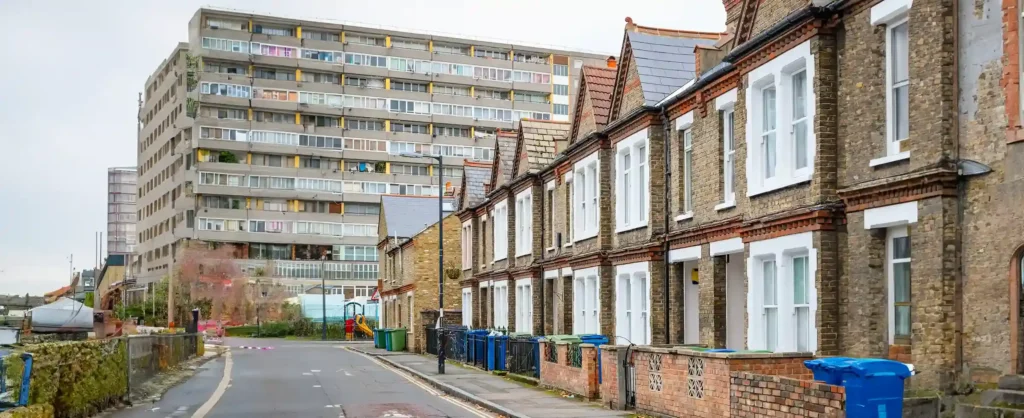UPDATE: Since publishing this article, average mortgage rates in the UK have shifted as a result of average interest on mortgages being adjusted by the Bank of England as well as other market factors.
According to Rightmove, the average mortgage rate for a five-year fixed rate mortgage is 4.84%. For a two-year fixed-rate mortgage, the average mortgage rate is 5.22%. The base rate set by the Bank of England is currently 5.25% and has remained at that level since August 2023.
Have you been caught off-guard by mortgage rates this year? Are you wondering what the cause of those rates might be and how you can defend your investments against them going forward?
Team CCG is here to help. We’ve put together a handy recap of how mortgage rates have been changing recently to give investors like you a better understanding of what’s been happening and why.
What are the Current Mortgage Rates?
Mortgage rates are a direct consequence of interest rates as dictated by banks and lenders, notably the Bank of England.
This August saw the 14th consecutive interest rate hike by the Bank of England to reach the highest level since February 2008. This hike not only means an increased cost of living for the general population but also much higher mortgage rates for current and potential homeowners compared to this time last year.
At the time of this article’s publication, the current base interest rate has risen by 0.25% compared to 18 months ago, reaching a total of 5.25%.
For the average tracker mortgage holder, this rise means an increase in annual mortgage repayments of approximately £285.
For those on a standard variable rate (SVR) mortgage, payments could increase by approximately £182 per year.
With all 14 rate rises taken into account, however, average monthly mortgage repayments have increased by approximately £488.50 for tracker deals and £311.90 for SVRs, totalling an average annual increase of £5,862 and £3,742.80 respectively.
This grim news has sparked no small amount of panic and despair among homeowners, many of whom were already struggling with the ongoing cost of living crisis and will likely be forced to take extreme measures to keep up with the increases to their monthly payments.
Why Have Mortgage Rates Been Rising Recently?
The global economy has been subject to a range of pivotal events that have had a knock-on effect on the economic state of individual countries. This includes the Russia-Ukraine War which, according to the United Nations, has elevated commodity and energy prices and caused wide-spanning food shortages.
With the Consumer Price Index (CPI) rising to 6.8% in July this year, the Bank of England has attempted to combat the inflation caused by that rise using its Monetary Policy.
For those unfamiliar with the term, a Monetary Policy is a set of economic tools adopted by the monetary authority of a nation to influence its monetary and financial condition. Banks adopt and implement monetary policies to help accomplish certain economic goals such as boosting employment levels, stabilizing exchange rates or, in this case, reducing inflation.
For the most part, the measures introduced by the Bank of England’s Monetary Policy have had a positive impact on the rate of inflation, with the annual rate falling sharply to 6.8% in July from 7.9% in June. Still, core inflation – which does not account for volatile items like food or fuel – has remained unchanged from its rate of 6.9% in June and the UK’s overall inflation rate for July is still significantly higher than that of the US (3.2%) and Europe (5.3%).
As such, while falling inflation offers some hope for more stable mortgage rates, the UK is still in a shaky position compared to other regions. Experts predict that the base interest rate will likely peak around 5.75% in Spring 2024, which means property investors may have to endure another year of inflated mortgage rates and repayments before they begin to fall.
How Can I Save and Invest During the Mortgage Crisis?
As a landlord or investor, you may find that rising mortgage rates have put you at greater risk than most. This can be especially true if you own multiple properties or if you have a high loan-to-value (LTV) mortgage, as Zoopla’s Rental Market Report for June 2023 suggests that 20-30% of landlords with the highest LTV mortgages have been the most impacted by higher mortgage rates. For more on how the mortgage crisis is affecting landlords, visit our blog on the subject.
For those who are either dealing with the stress of high mortgage repayments on their existing properties or questioning the viability of investing in property at the current base interest rate, here are a few tips for protecting your finances and potentially turning a profit.
Your first step should be to ensure all mortgage repayments are under control.
One way to accomplish this is by overpaying on your mortgage. Some lenders allow their borrowers to overpay on their mortgages provided they prove financially responsible enough. This means taking care of existing debts to whatever extent you can. Overpaying can reduce the amount of interest you’ll accrue and potentially avoid any upcoming remortgaging at higher mortgage rates.
You may also benefit from a mortgage payment holiday, during which lenders may allow you to take a brief break from mortgage payments provided you are typically in good standing with them. Mortgage payment holidays are awarded on a case-by-case basis depending on the borrower, the lender and the economic climate. They may also affect your credit score
Lastly, many mortgage lenders are registered with the UK government’s mortgage charter, which makes them obligated to be clear and forthcoming with any options they might have for helping you repay your mortgage. This can be particularly useful for those on certain financial benefits, as mortgage interest support is an option several providers have available.
Regardless of how you address existing mortgages, taking out a new mortgage at an unprecedented period of mortgage and interest rate inflation is generally not recommended by financial experts.
For those who have the capital to invest but who want to avoid mortgages altogether, mortgage-free property investments are always a viable and accessible alternative that can net equally consistent returns without the risk. With fully managed, mortgage-free buy-to-let property, landlords can minimise their expenses and cut down on time spent catering to tenants while still seeing healthy profits.
What is the Average Rate on a Buy-to-Let?
The criteria for securing a buy-to-let mortgage is strict due to the perception that they are at a higher risk than other kinds of property purchases. Average mortgage rates on buy-to-lets fell to 5.5% in February according to Which.co.uk. While this could be an ideal time for buy-to-let investors to secure a mortgage, a mortgage-free investment in alternative housing could help avoid the turmoil of shifting average mortgage rates.
Will Average Rates Come Down Soon?
Until the average interest on mortgage rates falls, it is unlikely that the average mortgage rate will come down.
The Bank of England’s rate is at its highest level in 16 years according to BBC News, with inflation at nearly twice its target rate. If it wishes to avoid further rises in average mortgage rates, it will need to find a way to slow price rises without damaging the stalling economy. This will require them to keep interest rates high for the foreseeable future.
Although mortgage rates have been surging since the Bank of England raised the base rate to meet its 2% inflation target in December 2021, this year has seen increasingly frequent shifts that have left many homeowners and landlords feeling uncertain.
Now, as rising mortgage rates make renting a home cheaper than the average two-year fixed mortgage for the first time since 2010 and the Bank of England continues to struggle with long-term solutions to the problem, some may be wondering what the future holds for the property market in the face of so much turbulence.
Making it Through Rising Rates with Concept Capital Group
At Concept Capital Group, we lead the way in mortgage-free property investment through the cost-effective process of high-quality modular construction.
With over 123 sites across the UK and a pre-approved list of tenants ready to be placed in every home we manufacture, we can assure our clients that they will receive their first rental income within 90 days of purchase and enjoy consistent monthly payments as soon as they do. No void periods, no hidden fees and no rising mortgage rates to worry about.
To find out how you can invest with Concept Capital Group, book a call with our team today.













